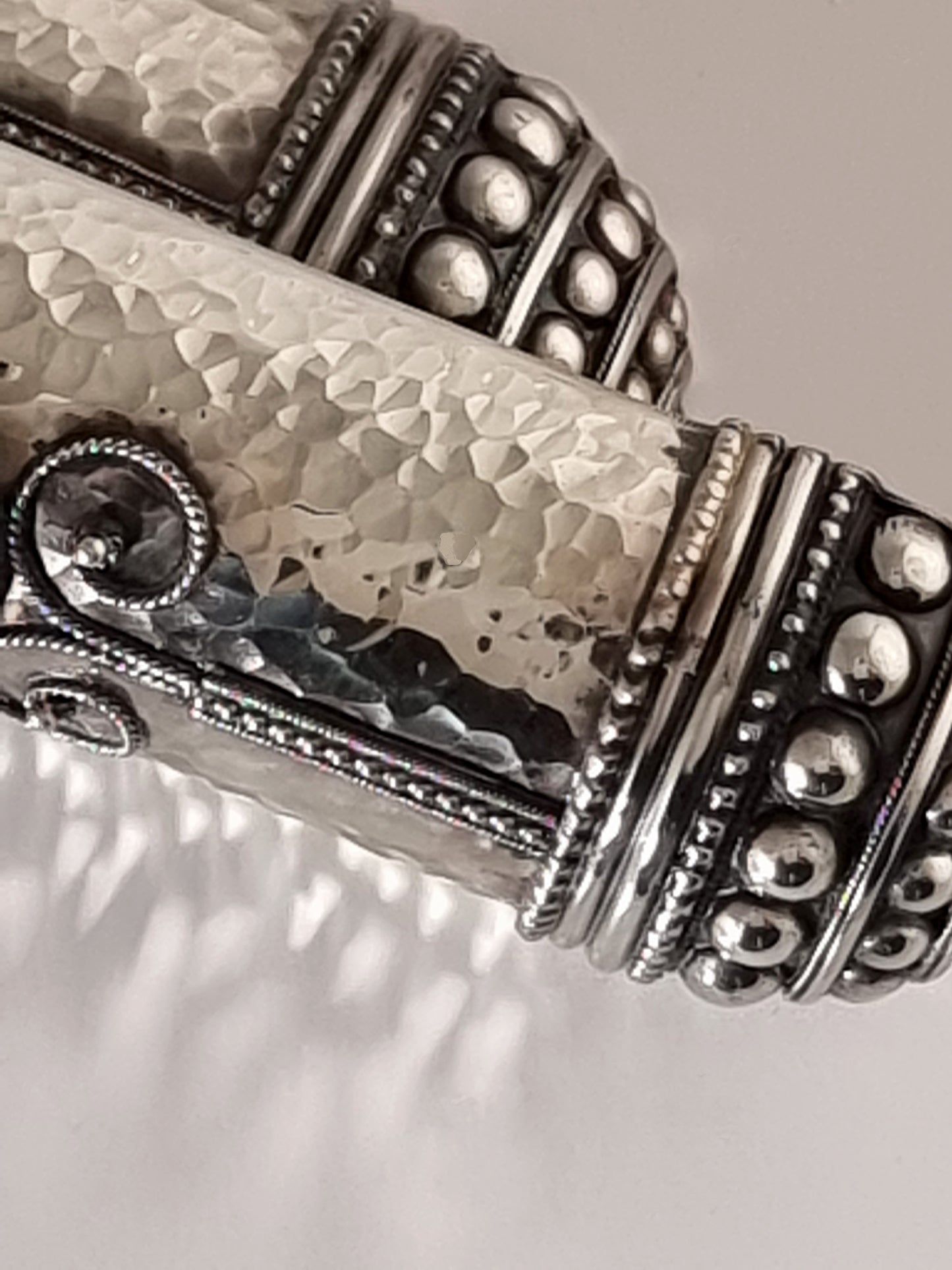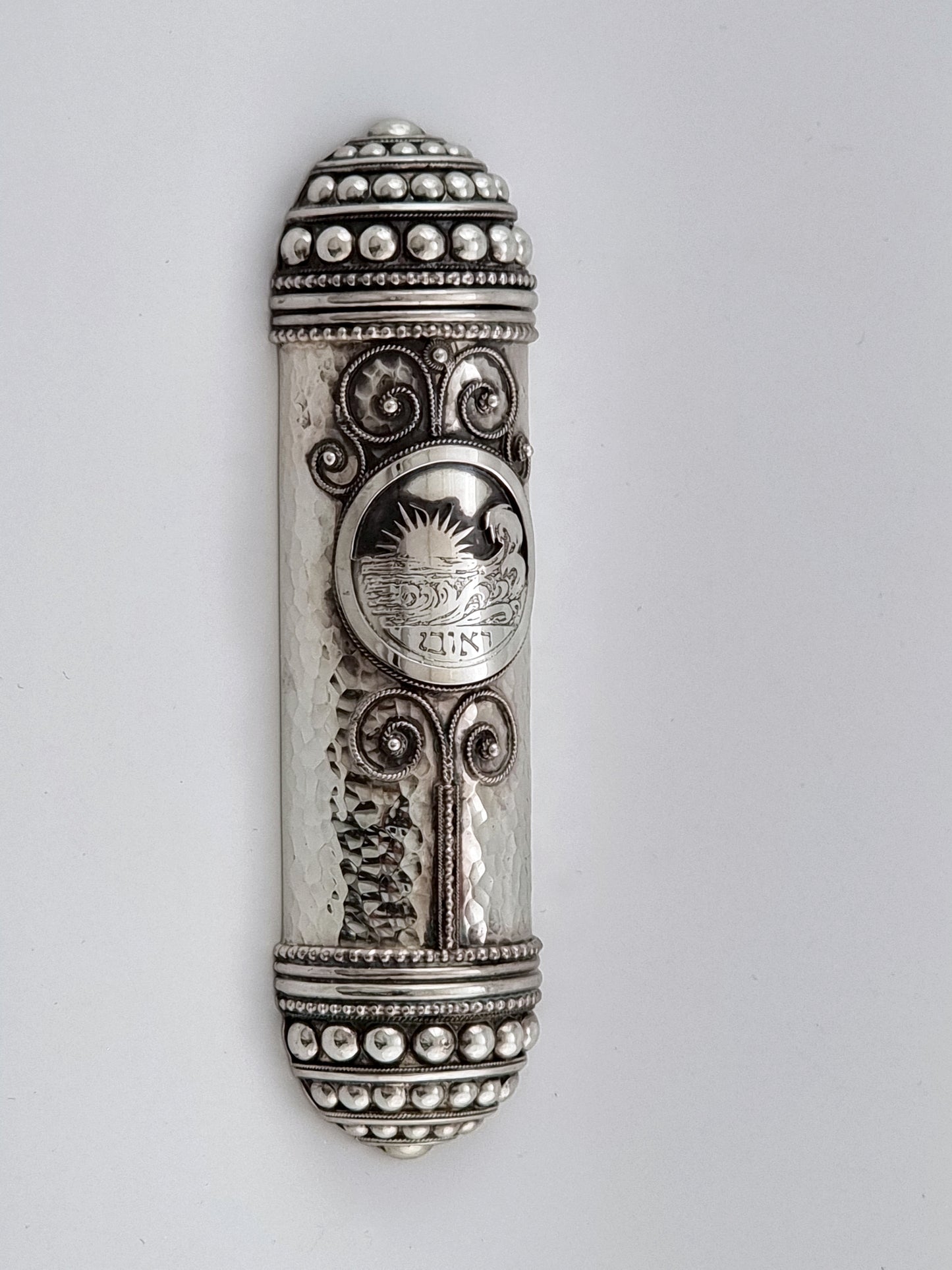Yemini
Tribes of Israel Mezuzah Set
Couldn't load pickup availability
This twelve-piece mezuzah set was designed in 1997; each piece is made of sterling silver and measures 5¼” long and 1½" wide.
Each mezuzah depicts an historic representation of one of the Twelve Tribes of Israel. Reuven is represented by the sun, Shimon by the walls of Shechem, Levi by the choshen (breastplate) of the High Priest, Yehuda by the lion, Issachar by the donkey, Zevulon by the ship, Dan by the serpent, Naphtali by a doe, Asher by the olive tree, Yosef by the bull, and Benyamin by the wolf.
Stamped with Yemini triangle emblem, Yaacov Yemini, Sterling 925, ירושלים
The 12 tribes of the House of Israel are the descendants of the Patriarch Yaacov and his two wives, Leah and Rachel, and his two concubines, Zilpah and Bilhah. Leah had six sons - Reuven, Shimon, Levi, Yehuda, Issachar, and Zevulon. Each of the other women had two sons each. Rachel's were Yosef and Benyamin; Zilpah’s, Gad and Asher; and Bilhah's, Dan and Naphtali. In Yaacov’s blessings, each of the sons is described allegorically and symbols for the tribes have been derived from these descriptions as well as from other biblical passages.
REUVEN
Firstborn son of Yaacov and Leah, his name comes from the Hebrew meaning: “Look, a son.” However, Reuven showed disregard for his father’s honor and lost any special status due him as firstborn son. Reuven is compared to running water, unstable, and one that cannot excel. The tribe of Reuven settled west of the Jordan River. “Reuven, you are my firstborn; my might and the beginning of my strength, preeminent in dignity and preeminent in power. Uncontrolled as water, you shall not have preeminence, because you went up to your father’s bed; then you defiled it—he went up to my couch"
(Genesis 49:3-4)
SHIMON AND LEVI
Shimon was the second son of Jacob and Leah; the Hebrew meaning of his name means "God has heard that I was unloved" (Genesis 29:33). He and his brother Levi destroyed the entire city of Shechem in retribution for the rape of their sister Dinah. The gate of the city appears on the tribe's symbol. The tribe of Shimon lived in the southernmost part of the Land of Israel. Levi was the third son of Yaacov and Leah. Since Leah had already given Yaacov two sons, she said "Now my husband will be joined with me" (Genesis 30:34). The Levites were distinguished as servants to God because of their refusal to worship the Golden Calf. The Levites "kept the charge of the tabernacles of testimony" (Num. 1:53); they had no territory of their own and were dispersed among the other tribes. Their emblem was the shield of the High Priest on which were engraved, upon precious stones, the names of all tribes. "Shimon and Levi are brothers; their swords are implements of violence. Let my soul not enter into their council; let not my glory be united with their assembly; because in their anger they slew men, and in their self-will, they lamed oxen. Cursed be their anger, for it is fierce; and their wrath, for it is cruel. I will disperse them in Yaacov, and scatter them in Israel."
(Genesis 49:5-7)
YEHUDA
Yehuda was the fourth son of Yaacov and Leah, who upon giving birth to Yehuda said "Now I will praise God." The tribe of Yehuda inhabited Jerusalem during the reign of its kings David and Solomon and was later the kingdom of all of the southern tribes of Israel. The Kingdom of Yehuda was to become the most powerful of all the tribes, and is aptly represented by the king of the animal world – the lion. "Yehuda, your brothers shall praise you; your hand shall be on the neck of your enemies; your father’s sons shall bow down to you. Yehuda is a lion’s whelp; from the prey, my son, you have gone up. He couches, he lies down as a lion, and as a lion, who dares rouse him up?”
(Genesis 49:8-9)
DAN
Dan was the fifth son of Yaacov and the first son of Bilhah (Rachel's maidservant); when Rachel was convinced that she was unable to have children, she cried "God has judged (Hebrew: dan) me." The original area of the tribe of Dan extended from Jaffa southward. Samson was a son of this tribe. As it could not conquer its entire territory, Dan looked to settle elsewhere and the tribe moved north to the source of the Jordan River, captured the city Laish, and settled there. The tribe of Dan also settled in the southern part of the country and since the tribal territory covered both northern and southern parts of the country the expression "from Dan to Beer-Sheba" indicates the entire span of the Israelite land. Dan is represented by the serpent. "Dan shall be a serpent in the way, a horned snake in the path that bites the horse’s heels, so that his rider falls backward.”
(Genesis 49:17)
NAPHTALI
Naphtali was the sixth son of Yaacov and the second of Rachel's maidservant Bilhah. Naphtali was given his name because Rachel said "With great wrestling have I wrestled my sister.” The tribe of Naphtali settled in northern Canaan and it played a central role among the tribes located there. Naphtali is represented by a gazelle or running stag. “Naphtali is a hind let loose. He gives beautiful words.”
(Genesis 49:21)
GAD
Gad was the seventh son of Yaacov and his mother was Zilpah, Leah's maidservant. Gad's name comes from the Hebrew word troop. Leah named him Gad, saying "A troop is coming." The tribe of Gad settled in the land of Gilead, east of the Jordan. It did battle against Amon and Moab coming from the south, wandering tribes from the east, and Aram from the north and is represented by the tents of the camp. "Raiders will raid Gad, but he will raid at their heel"
(Genesis 49:19)
ASHER
Asher was the eighth son of Yaacov and his mother was Zilpah, Leah's maidservant. Leah named him Asher, saying "Happy am I." The coastal strip from the foot of Mount Carmel up to Sidon was inhabited by Asher, the fertility of whose land was indicated by an olive tree. "From Asher will come the richest food; he will provide the king's delights"
(Genesis 49:20)
ISSACHAR
Issachar was the ninth son of Yaacov and fifth son of Leah; one interpretation of his name is "man of reward" (Hebrew: s’char). Issachar settled in Egypt after the famine in Canaan. Issachar's territory was the Plain of Esdraelon, from the sea to the banks of the Jordan. The descendants of Issachar are men of learning according to Jewish tradition. The symbol of the tribe is a donkey laden with sacks. “Issachar is a strong donkey, lying down between the sheepfolds. When he saw that a resting place was good and that the land was pleasant, he bowed his shoulder to bear burdens, and became a slave at forced labor.”
(Genesis 49:14)
ZEVULON
Zevulon was the tenth son of Yaacov and sixth of Leah. When he was born Leah said "God has provided me with a good dowry" (Hebrew: zvad). The symbol of the tribe is a ship on high sea. “Zevulon will dwell at the seashore and he shall be a haven for ships and his flank shall be toward Sidon.”
(Genesis 49:13)
YOSEF
Yosef was the eleventh and most beloved son of Yaacov. He was born to Yaacov’s favorite wife, Rachel, in Paddan-Aram after she had been barren for seven years. "A troop shall overcome him: but he shall overcome at the last." Yosef was the principal tribe in central Eretz Israel, which split into Menasheh and Ephraim, named after Yosef’s two sons by his wife and Pharaoh’s daughter Asnat. Yosef is compared to a wild ox, sometimes interpreted as a bull, with the multitudes of Ephraim and Menasheh compared to its two horns. (Deut. 33:17) "Yosef is a fruitful bough, even a fruitful bough by a well; whose branches run over the wall: The archers have sorely grieved him, and shot at him, and hated him: but his bow abode in strength, and the arms of his hands were made strong by the hands of the mighty God of Yaacov; even by the God of thy father, who shall help thee; and by the Almighty, who shall bless thee with blessings of heaven above, blessings of the deep that lieth under, blessings of the breasts, and of the womb: The blessings of thy father have prevailed above the blessings of my progenitors unto the utmost bound of the everlasting hills: they shall be on the head of Yosef, and on the crown of the head of him that was separate from his brethren."
(Genesis 49:22)
BENYAMIN
Benyamin was the twelfth son of Yaacov, second son of Rachel. Originally named Ben-oni or “son of my affliction by his mother as she lay dying in labor, his name was later changed to Benyamin, meaning "son of my right hand.” Next to Yosef, he was Yaacov’s favorite son, born after Yosef was sold into slavery. Benyamin has remained the symbol of the tender youngest child. The tribe of Benyamin, however, was considered particularly warlike and courageous. To this tribe belonged Saul, the first king, and Yonatan, his son. The symbol of the tribe is the wolf, a predatory animal. "Benyamin is a ravenous wolf: in the morning he shall devour the prey, and at night he shall divide the spoil."
(Genesis 49:27)
Share













































